On Ireland, Israel, And ... The Eurovision Song Contest
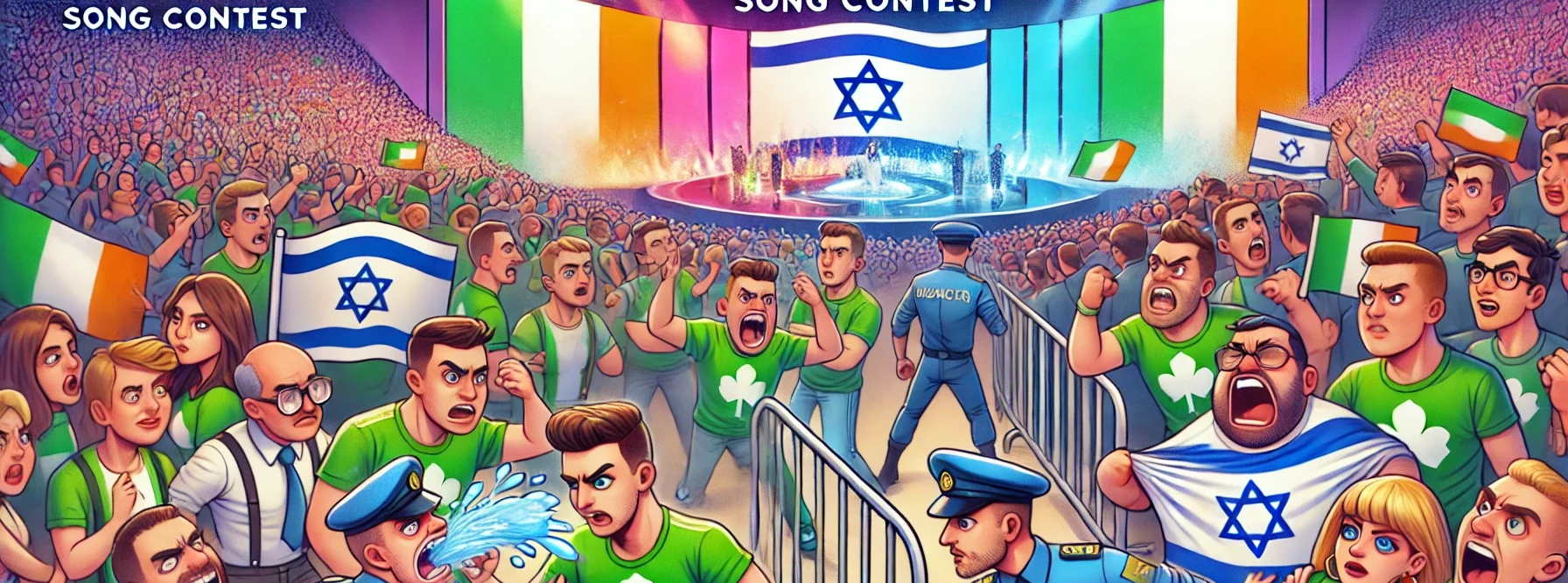
(Opinion)
Since the horrors of October 7th, a lot has changed in my life.
While Hamas was carrying out its barbaric assault on men, women, and children, I was taking some rest (I hope well-deserved) on the beaches of Barcelona.
Last weekend marked the first time since those atrocities over 6 months ago that I felt comfortable spending time on a beach again.
While hostages remain trapped in tunnels, it has taken an awfully long time for any kind of recreation to not feel disrespectful and irreverent. But a belief that the show must go on is perhaps the defining characteristic of Israeliness.
My trip to Barcelona that coincided with the outbreak of war was a quick weekend excursion after a business conference. My main priorities were drinking beer, eating tapas, seeing the city, and catching up on sleep robbed by successive late nights followed by early starts (I’m not a conference lover).
All I remember is the sense of unfolding horror as the news trickled in from Israel and the magnitude of what had occurred slowly unfolded. And an inspiring PA from the El Al crew intoning, seriously, that El Al was committed to maintaining Israel’s air links with the world - both during the best of times, for the state, and the worst of them.

Photo: A sign displayed in Ben Gurion Airport after the outbreak of war directing passengers to emergency shelters.
Ireland’s Now-Legendary Hostility Towards Israel Is Longstanding, Institutional
October 7th and the ensuing and ongoing war to eliminate Hamas has shaken up Israel’s foreign relations perhaps more decisively than any other event in its young history.
Newfound alliances with the Arab World have been stress-tested and, in many cases, found to be wanting in the goodwill necessary for their sustenance.
We’ve been reminded that the “peace” Israel enjoys with some of its closest neighbors is best understood as a military pact of mutual non-destruction.
Europe has been a mixed picture. Study of the political reaction to Israel has been overshadowed by concern about mushrooming antisemitism.
But one country has stood out as quite remarkable for the depth of its anti-Israel sentiment which seems at odds with its geopolitical affiliation with the European bloc - and that’s the Republic of Ireland.
Theories Abound As To Why Israel Seems To Uniquely Stir Irish Animus
There are many ways to look at the Republic of Ireland’s reaction to October 7th and its increasingly feverish and misguided embrace of militant pro-Palestiniasm.
Not a small amount of ink - both digital and real - has been spilled since then offering verbose and sometimes self-exonerating explanations for Ireland’s now legendarily negative fixation with the world’s only Jewish state.
In the immediate aftermath of October 7th, I began commenting on Ireland-Israel relations on Twitter - to the extent to which I’m probably mildly synonymous with those things in Ireland.
I was among the first entrants into an ideological battlefield that now feels oddly crowded (Irish commentators tend to insist that warped parallels with British colonialism “explain” the extent of their vitriol; Jewish and Zionist ones like me will always respond that those arguments display a shocking ignorance of Jewish history and our connection to the land of Israel).
I took to these usually thankless debates on Twitter primarily because I have enough skin in the game to care deeply about the topic, but not quite so much that I’m at risk of immediate bodily harm or having a brick thrown in through my window if I tick off the wrong people.
I was born Jewish in Ireland.
And in the very immediate wake of October 7th, I witnessed how those whom I considered to have been good friends began posting blood libels about Israeli bloodthirst.
I believe simultaneously in the freedom of speech and the press but also that neither freedom must be absolute.
And so I tried to focus my advocacy efforts on highlighting what I believed to be naked anti-Semitism in the Irish public discourse that was going essentially unchallenged - even when uttered within the halls of parliament.
The great folly of hasbara (as I see it) is trying to coerce the world into adopting a uniquely pro-Israeli view that is neither grounded in reality nor held by many people (like me) who are actual tax-paying citizens of the state.
Converting Ireland into a nation of Israel-lovers is an objective that nobody would see as credible. But highlighting anti-Semitism would (one might have hoped) do something to ensure the welfare of Ireland’s small and dwindling Jewish community.
Unfortunately I came to the conclusion that like trying to win sympthy or basic understanding for Israel’s position in Ireland, that’s a lost cause.
Ireland’s Parliament Includes Politicians Who Openly Call For Israel’s Destruction - To A Dearth Of Criticism
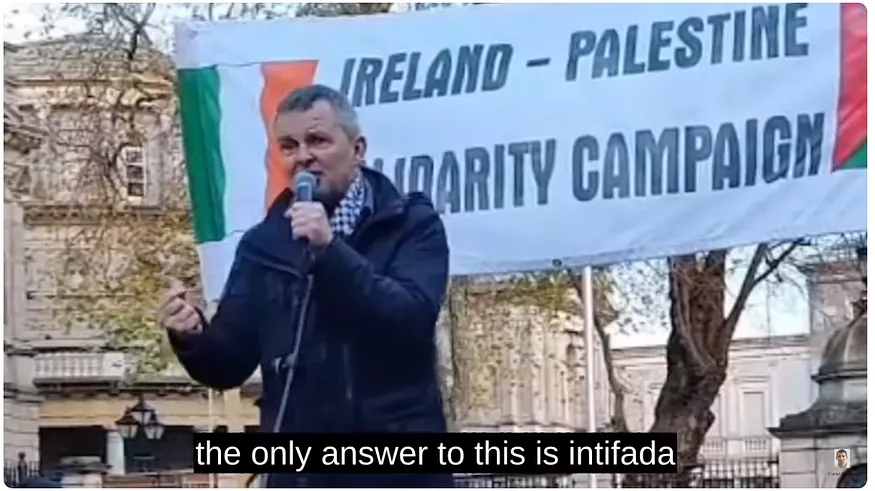
Caption: Richard Boyd Barrett calling for an “intifada” against Israel while Ireland was debating the parameters of hate speech legislation. A defining moment in my relationship with the country of my birth.
The apex of my briefly renewed efforts at pro-Israeli advocacy, perhaps, was posting a video clip of a politician calling for the destruction of Israel through intifada that subsequently went viral on Twitter/X to the tune of about one million or so retweets.
As it picked up steam and friends of Israel were rightly astonished by the phenomenon of a Western parliamentarian being flanked by police while cosplaying as Ayatollah Khomeini, the Irish media was eventually coaxed into acknowledging that a member of parliament calling for the violent destruction of another nation was … perhaps worthy of public attention.
The only pushback I received came from self-identified members of Ireland’s diminuitive “pro-Israel” community. In attempting to highlight the rhetoric, I found myself in sometimes vehement disagreement with them. I continue to feel that the official representatives of Irish Jewry have been unacceptably meek in failing to highlight the gravity of the antisemitism growing in Ireland which has depicted the country internationally as a hostile environment for Jews.
I felt, and still do, that forgiving hate speech on the basis that it’s uttered by marginal voices is a failing strategy - well-demonstrated, I would add, by 1930s’ Germany, but more pragmatically by the fact that such words inspire action. In any event, my efforts eventually drew to a bumbling half-condemntation from Ireland’s Foreign Minister Michael Martin.
Boyd Barrett himself - when confronted at a press conference with the video that I shared on Twitter - doubled down on the remarks, which included describing Israel as “filthy” and “bararbic” - comments which drew the most painfully tepid of condemntations from a solitary member of Ireland’s government. Again, the reaction was studied silence.
I have written about Ireland-Israel since and will do so again.
But it was at precisely this point that I came to the conclusion that (from a Jewish perspective, from a pro-Israel one) Ireland was a lost cause.
The only Ireland I knew, growing up, was one that was adamantly anti-Israel. Where merely uttering the country’s name was akin to announcing one’s fondness for paedophilia with a loudspeaker on a main street at midday.
I may have left Ireland almost a decade ago, but the national policy remains unchanged. Or as Eccliasiastes once intoned, there is nothing new under the sun.
For Jews, for Israelis, Ireland remains the coldest of cold houses.
Ireland’s Infamous Basketball Snub Turned The Tide On Jewish Perceptions Of Ireland
Like many, the longer that Official Ireland’s protracted, bizarre, and intensely negative fixation has dragged on, the more I’ve found myself tuning it out.
The parade of hatred may have reached its inglorious nadir with Bambie Thug’s satanic rendition at Eurovision. But it was the storm in a teacup event of a women’s basketball game between Ireland and Israel that really set relations on an incorrigible descent into the abyss.
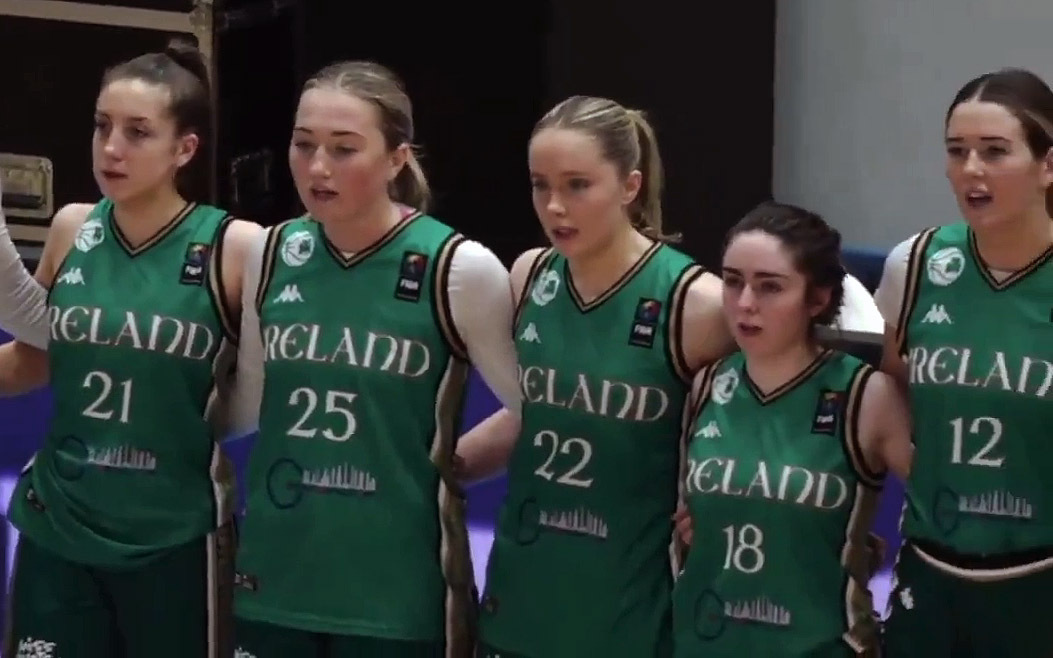
Many Israelis - legendary globetrotters - tend to cling to a rosey vision of Ireland, regarding it as a wonderful sort of anithesis to beleaguered, war-torn Israel. Ireland was for a few years the most popular tourism destination (bar none) for Israeli travellers. Prior to BasketballGate most seemed blissfully unaware of the extent of the antipathy with which their country was held in Ireland.
In the Israeli collective imagination, Ireland was a kind of easy mental surrogate for the kind of society that might blossom here were Israel not stuck in the middle of a hostile Middle East.
Where Israelis are famously argumentative and debating is a sort of national pasttime, the Irish are famously congenial and easygoing. Israelis love hiking and Ireland is full of beautiful countryside. Like Israel, Ireland is a small country with big ambitions. Unlike Israel, it’s not mired in a hot Meditteranean climate and endless war.
The whole edifice of that charming image came tumbling down on the night of that basketball fixture. That display cemented a now entrenched view of Ireland as a country wholly hostile to Israel - and Jews.
In today’s Israel, Ireland is seen as a curiosity - and a good case-study in the fact that anti-Semitism usually supercedes the bounds of good reason.
Ireland is European in geography but now almost Middle-Eastern in its hostility to Jews and Israel.
It’s a country that seems entirely blinkered to the Jewish connection to the land of Israel but steadfastly assured in its conviction that backing Hamas and its supporters affords a moral high-ground over those of us less enlightened.
Like the PA, it even endorses a curriculum that inculcuates a warped anti-Israel perspective of the conflict in primary schoolers. These are only some of the end products of the massively prevalent view in Ireland that Zionism is something like an abortive form of Judaism and that it is therefore entirely justifiable to be rabidly opposed to only Jewish self-determination.
So it wasn’t surprising that when Ireland’s Eurovision entrant (the appropriately named) Bambie Thug took to the stage of Malmo at Eurovision she was greeted, at my local pub, by whole-lunged booing - a treatment not afforded to any other contestant. Things have changed.
In protest at being called anti-Semitic, Ireland’s women’s basketball team chose to display their dislike of their Israeli counterparts by refusing to shake hands with their Israeli counterparts.
That crude show of hatred, once endorsed by Ireland’s politicians as a show of principled maturiy, pegged Ireland to a level of bitter animosity previously only seen by Israel’s classic opponents in the Arab world - which is why I find it interesting.
Even those in Ireland who opposed the previous plan to boycott the fixture did so on pragmatic grounds and not out of the conviction that doing so was morally opprobrius (Ireland backed down only after being threatened by basketball’s governing body with a crushing fine).
The hate gesture’s adulous reception in Ireland allowed many Israelis to finally move past the ongoing Irish parade of hatred for the Jewish state - to externalise it to an extent.
Just as we don’t spend time poring over how the Iranian ayatollahs worded their latest statement urging death on Zionists, we realised that we needn’t waste time baffling over why Ireland and the Irish seem so massively opposed to “just Zionism” (trademark pending).
Ireland’s insistence on its neutrality and seemingly desperate desire to interject itself as an intermediary in the Israel-Palestinian peace process can be rightly seen as laughable.
Just like Bambie Thug’s tirade at the Eurovision, the occasion was trivial. But the gestures had onoing resonance.

Pro-Israel supporters gathered outside the Israeli Embassy in Dublin
It’s true that a passionate group of pro-Israel voices (doing marvellous work) take umbrage at being lumped in with the vast majority of Irish people who (one feels at times) enjoy ritualistically burning the Israeli flag as a morning routine after brushing their teeth.
Some insist that they are the silent majority and Ireland’s surprising voting pattern in the Eurovision has been corraled as evidence to support that claim. On the Israeli side, such claims seem fantastical. But however few and outnumbered they are, their efforts are appreciated.
The Only Question: Why Didn’t Israel Close Shop In Dublin Sooner?
I’ve had debates online and even lively ones with a journalist friend (over pints of Guinness, of course) about why Ireland didn’t chose to withdraw its beleaguered representative in Dublin sooner.
I’ve long contended that, viewed rationally, it’s a source of diplomatic mystery. Perhaps the mystery is now solved.

Israel’s brave representative in Dublin - Ambassador Dana Erlich - has been subjected to a relentless campaign of hatred and personal intimidation that has been tacitly (no, I don’t think this is an exaggeration) endorsed by the State itself.
The weekend before Iran sent suicide drones and missiles to try to kill as many Israelis as possible, Ireland’s leading party - Fianna Fail - snubbed Erlich from its annual think-in, breaking with longstanding diplomatic protocol. Iran’s diplomatic representative in Ireland made the list. In another departure with protocol, this was gleefully highlighted to the media. Perhaps nothing speaks more cogently about the moral bankruptcy of Ireland’s pro-Palestinianism than feting the Iranian ambassador hours before his country launched an unprovoked war against Israel.
Israel Has Become A National Obsession In Ireland
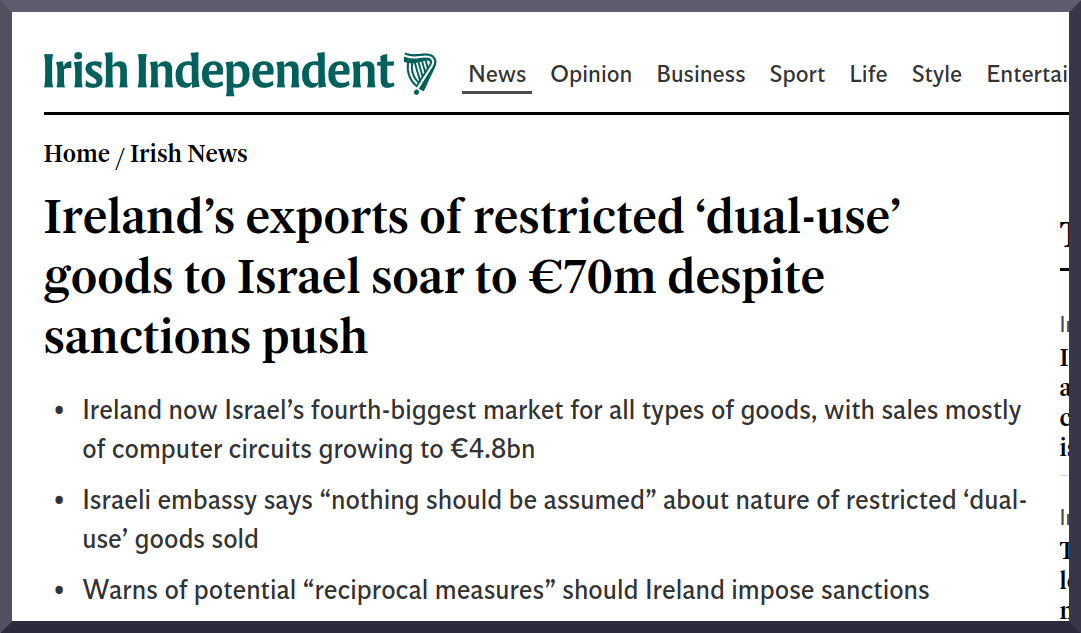
The extent to which Israel has become a topic of national obsession in Ireland can scarcely be understated or exaggerated.
When not sending her packages of fake anthrax, Ireland’s pro-Palestinian community is busily calling for her ouster or erecting blood libel inspired photos of Erlich drenched in fake blood and affixing them to lampposts over Dublin.
Israel’s trade relationship with Ireland is modest compared to its major trading partners and in recognition of the nose-dived interest in Ireland among Israeli and (sane) Jewish tourists, El Al pulled its brief-lived direct connection to Dublin shortly after the war broke out.
Israel responded to acts of hostility by Turkey and other nations by withdrawing its diplomats so why the double standard in the face of the Irish circus of hate?
I pointed it out on Twitter a few times and got my answer today: it’s been on the agenda for some time, but the time to begin pulling the plug wasn’t quite ripe until Ireland “recognised” the non-existent state intent on its destruction.
The Bigger Geopolitical Picture: The EU, The US, And Who Ireland Will “Inspire”
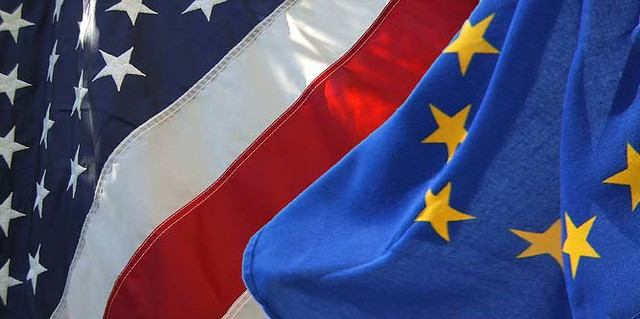
For as many words as have been written about the quickly-devolving relationship between Israel and Ireland only a few really suffice: it’s bad and getting worse. Which is sort of like this year’s Eurovision. You can’t pull yourself away even if you know there’s nothing good in store.
But in the broader scheme of the shifting sands of Israel’s geopolitical calculus, Ireland isn’t a top level concern.
For now, its nefarious efforts to have Israel’s agreement with the EU upended have been rebuffed by states with a steadier moral compass. Ireland has roped in Spain and Norway in a sort of oddball threesome of countries whose only mutual connection seems to be a common disdain for Israel. But for now its efforts haven’t had the kind of global leading role that they seem to aspire to hold.
The rub in this whole tale:
Ireland is significantly dependent upon multinational companies using it as a tax base and may be grossly underestimating the extent to which its vitriolic diplomatic war against Israel is offputting even to those who may not be Israel’s traditional political friends.
The unquestioning embrace of a government that unapologetically pays salaries to those convicted of slaying random Israelis, in which the vast majority of its citizens condone the actions of October 7th, is not a look that quite everybody is onboard with (at least yet).
Much remains to be seen, of course.
But if there are larger ramifications from the undulating waves of fallout between Ireland and Israel it will likely be in these realms rather than direct effects.
I mean, how many ways are there one can really say “we really don’t like you”?
By: Daniel Rosehill

Creative Commons Attribution 4.0 International License